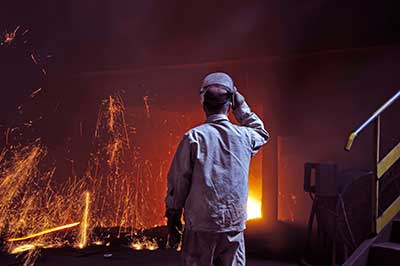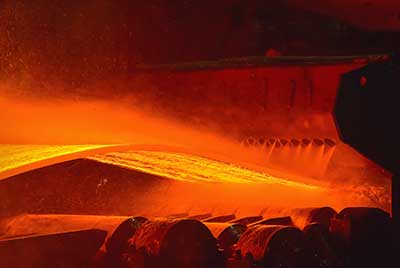Steel Mill Operator Staffing
RSS is Your Trusted Source for Steel Mill Operators
With decades of expertise in temporary workforce solutions, we know the importance of avoiding staff shortages to maintain peak performance. The RSS team offers your company access to proficient, seasoned, and dependable steel mill operators who will seamlessly integrate with your existing workforce.

Regional Supplemental ServicesOn-Demand Reliable Workforce

Steel Mill Operators
Whether you’re dealing with temporary staff shortages, adapting to seasonal demands, or ramping up for a short-term project, RSS is your reliable source. Our adaptable staffing solutions are designed to seamlessly align with your unique needs, ensuring that your steel mill operations continue smoothly without any disruptions.
Rapid Response Staffing: With no room for downtime in steel mill operations, our emergency staffing services are primed to tackle unexpected vacancies quickly. We’re here to help you maintain seamless operational continuity and uphold strict safety standards.
Effortless Recruitment: Leave the heavy lifting to us. At RSS, we understand the intricacies of recruiting talent for steel mill operations. From sourcing and vetting to matching and onboarding, we handle every step of the recruitment process. This means you can focus on your core operations, knowing that your staffing needs are expertly managed and fulfilled, allowing you peace of mind and the freedom to concentrate on what you do best.
Benefits Cost Savings: Bypass the expenses associated with providing health insurance, sick leave, vacation pay, workers’ compensation, and retirement savings plans. We take on these costs and the administrative duties that come with payroll and tax management.
Skilled and Reliable Steel Mill Operators.
Every one of our steel mill operators is thoroughly screened and possesses the necessary qualifications and experience to work in a steel mill. Our commitment extends to keeping them up-to-date with the latest safety standards and operational best practices.


Positions We Fill
Steel Mill Operator
Utility Worker
Mill Operator
Pipefitter
Rolling Mill Operator
Maintenance Staff
Welder
And More!
Discover The RSS Difference
Comprehensive Vetting Process: RSS employs a rigorous screening and vetting process for workers, including in-depth interviews, skill assessments, and background checks. This ensures that only the most qualified and reliable individuals are placed, reducing turnover and enhancing job satisfaction.
Focus on Long-Term Relationships: RSS prioritizes building long-term relationships with clients and candidates. This means understanding clients’ evolving needs and company culture to make better staffing matches. For candidates, it means career counseling and development opportunities beyond the initial placement.
High-Quality Support and Services: RSS offers exceptional support services, including onboarding assistance, ongoing training and development programs, and responsive customer service to handle any issues promptly. This level of support ensures a smooth process for the employer and placed workers.
Customized Solutions: Rather than a one-size-fits-all approach, RSS offers tailored staffing solutions that consider each client’s unique needs. This customization ensures staffing strategies align with the client’s objectives and challenges.
Contact Us
Don’t let staffing challenges disrupt your steel mill operations. Contact RSS today and discover how we can help you maintain smooth, efficient, and safe operations with our expert temporary staffing solutions.
Client Testimonials
Frequently Asked Questions
What are the Pros and Cons of working in a steel mill?
Pros of Being a Steel Mill Operator
- Stable Employment: The steel industry is foundational to various sectors, including construction, automotive, and infrastructure, which can provide job security.
- Competitive Wages: Due to the specialized skills and sometimes hazardous working conditions, steel mill operators often receive competitive wages compared to other manufacturing and industrial jobs.
- Skill Development: Working in a steel mill offers the opportunity to develop a wide range of skills, including operating complex machinery, understanding metallurgical processes, and adhering to strict safety protocols.
- Benefits: Many steel mill operators work for companies that provide comprehensive benefits, including health insurance, retirement plans, and paid time off.
Cons of Being a Steel Mill Operator
- Physically Demanding: The job can be physically strenuous, requiring operators to stand for long periods, lift heavy objects, and perform repetitive tasks.
- Hazardous Conditions: Working in a steel mill can be dangerous due to heavy machinery, high temperatures, and potentially toxic materials. Strict adherence to safety protocols is essential.
- Shift Work: Steel mills often operate 24/7, requiring operators to work in shifts, including nights, weekends, and holidays, which can impact work-life balance.
- Noise and Dirt: The working environment can be loud and dirty, which might not suit everyone.
Where are the steel mills located in the U.S.?
Steel mills in the United States are predominantly located in regions where there are strong historical ties to the steel industry or where there is convenient access to raw materials and transportation. These areas include:
-
The Great Lakes Region: This area is one of the most significant hubs for steel production in the U.S., primarily due to its proximity to the Great Lakes, which facilitates the transportation of raw materials such as iron ore. Major steel-producing cities in this region include Gary (Indiana), Cleveland (Ohio), Detroit (Michigan), and Chicago (Illinois).
-
The Northeast: Although the steel industry in this region has declined from its peak, there are still operational mills in states like Pennsylvania, which was historically the heart of the American steel industry. Cities such as Pittsburgh are renowned for their steel legacy.
-
The South: In recent decades, there has been a shift in the steel industry, with new mills opening in Southern states, including Alabama, Arkansas, and Texas. These areas have attracted steel companies due to their favorable business climates, including lower labor costs and taxes.
-
The Midwest: Beyond the Great Lakes, the broader Midwest region hosts several steel mills, benefiting from its central location for distribution across the country. States like Missouri and Indiana have significant steel production activities.
What does a Steel Mill Operator do?
A steel mill operator is a professional responsible for overseeing various aspects of the production process in a steel mill. Their primary role involves operating and maintaining the equipment used in the production of steel. This can include furnaces, rolling mills, finishing equipment, and other machinery specific to the steel industry. Key responsibilities often include:
- Control and Monitoring of Machinery: Operating equipment used in the different stages of steel production, such as melting, casting, rolling, and shaping.
- Quality Assurance: Ensuring that the steel produced meets specific standards and specifications. This might involve testing samples for quality control.
- Maintenance and Troubleshooting: Performing routine maintenance on equipment to ensure smooth operation, as well as diagnosing and resolving any technical issues that arise during the production process.
- Safety Compliance: Adhering to and enforcing strict safety protocols to prevent accidents and injuries in what can be a hazardous working environment.
- Record Keeping: Maintaining accurate records of production quantities, equipment status, maintenance schedules, and quality control measures.
- Efficiency Improvement: Identifying ways to increase productivity and reduce waste, often through making adjustments to machinery or production processes.
Steel mill operators require technical knowledge, physical stamina, attention to detail, and adherence to safety standards. They typically acquire their skills through vocational training, on-the-job experience, or a combination of both.
For Employers Looking for Staffing Solutions?
Employers please submit the form below regarding your need for staffing solutions.
